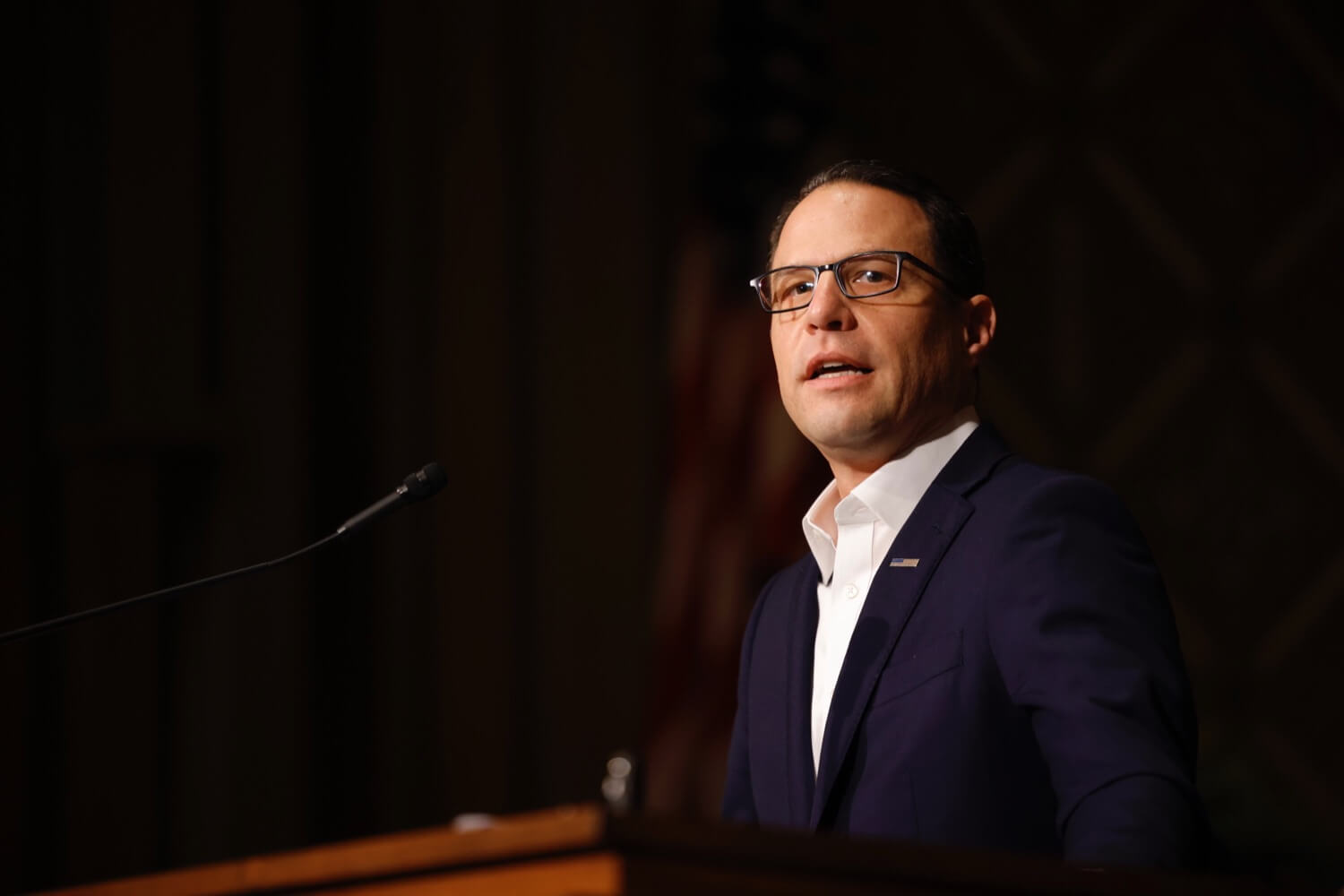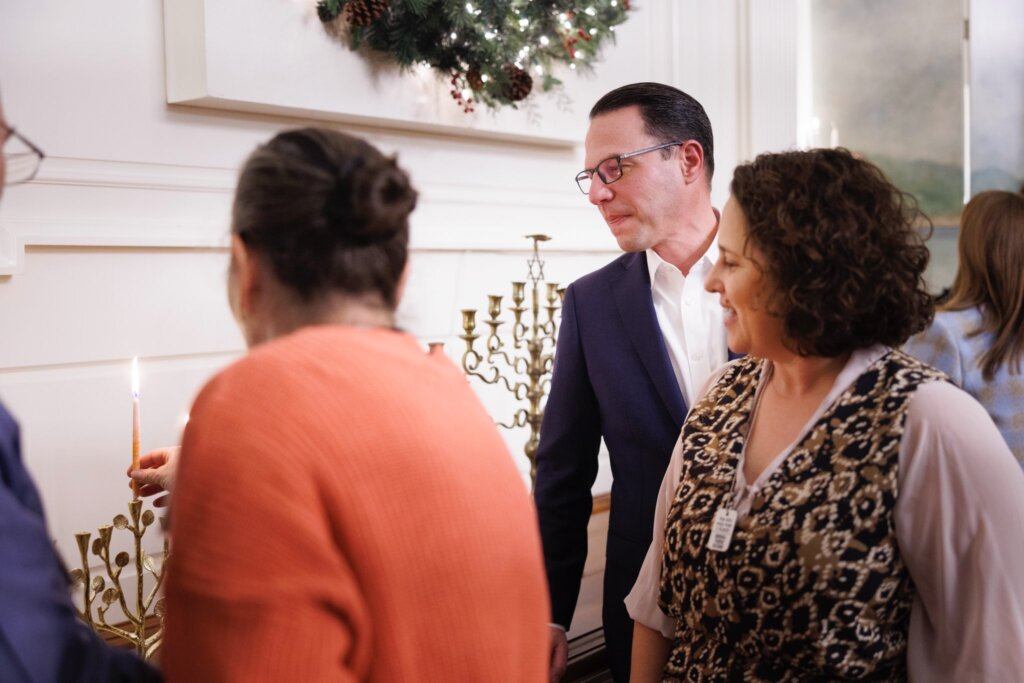Pennsylvania’s Jewish governor praises students who helped oust UPenn’s former president
Gov. Josh Shapiro credited Penn students who helped oust former President Liz Magill, and rejected calls for a cease-fire in the Israel-Hamas war as premature

Pennsylvania Governor Josh Shapiro at Rodeph Shalom Synagogue on Dec. 10. Photo by Office of Gov. Josh Shapiro/Commonwealth Media
Pennsylvania Gov. Josh Shapiro praised Jewish University of Pennsylvania students for their efforts to oust former President Liz Magill, who resigned Saturday in the wake of her widely-panned remarks about confronting antisemitism. And he criticized a “culture” at UPenn which he said does not take antisemitism seriously enough.
“We should not lose sight of the fact that this was never simply a personnel matter,” Shapiro said in an interview Sunday. “This is about the culture at Penn and other universities that makes some students, particularly Jewish students, feel unsafe at times.”
Penn, he continued, “has a responsibility not just to hire and appoint new people but to put systems in place that make sure all students can feel safe and that there is real accountability for those that spread hate on campus — professors, students, staff, anyone affiliated with the university.”
Magill’s resignation followed her Congressional testimony earlier in the week in which she hedged when asked if a call for genocide against Jews would be considered harassment under her Ivy League university’s code of conduct. Her response, that it would depend upon the context, drew harsh rebukes from public officials and Jewish leaders. Many Jewish students, alumni and donors — including the board of Wharton, the university’s business school — called for her to step down.
Shapiro decried her comments as ”shameful” and “a failure of leadership” but stopped short of saying she should lose her job.
On Sunday, Shapiro said Magill resigned because students were willing to speak out. “Leadership was held accountable,” Shapiro, 50, said to resounding applause at a rally against antisemitism held at Congregation Rodeph Shalom in Philadelphia, which is also home to the university. “The students did that.”
‘No nuance when it comes to condemning antisemitism’
Magill is the first college president to resign after protests and counter-protests over the Israel-Hamas war that began roiling college campuses two months ago. The former dean of Stanford Law School, Magill promised when she was inaugurated last year to protect free speech on campus. But like many college leaders, she has struggled since Oct. 7 — when Hamas attacked Israel and killed 1,200 Israelis — to balance supporting free speech rights with concerns that some speech has gone too far. Israel’s offensive in Gaza has killed more than 17,000, according to the Gaza health ministry.
Shapiro, who was sworn in as Pennsylvania’s 48th governor in January, said college administrators must take pains to distinguish hate speech from peaceful protests and criticism of Israeli government policies. “I think political issues in Israel are incredibly nuanced,” he said. “It is proper to have a nuanced debate over Israeli policy, over Palestinian policy, over the future of the Middle East. But it should not require any nuance to condemn hate speech, whether directed at a Jew or Muslim, or anyone else.”
Views on Israel
Reflecting on the current Israel-Hamas war, Shapiro said that calls for a cease-fire are premature. “I don’t think that you can have a cease-fire as long as Hamas remains in power,” he said. “They are a terrorist organization as designated by the United States of America, and you can’t simply allow a terrorist organization to be operating right on your border, just as we wouldn’t allow it in the U.S.”
He also called Israeli Prime Minister Benjamin Netanyahu “a failed leader” who took his country in a “very dangerous direction” prior to Oct. 7 by embracing a right-wing government and pushing an unpopular judicial overhaul plan. “It would seem that under his leadership, the government took the eye off the security risk to Israel,” Shapiro continued. “And as a result, over 1,200 Israelis were killed in Hamas’ terrorist attack.”
The Pennsylvania Democrat said that as a supporter of a two-state solution in the Israeli-Palestinian conflict, he believes both sides “have missed opportunities over the last two or three decades to find that peace.”
“That’s what I’m referring to as the nuance of the political debate in the Middle East,” he added.
Survivors light the menorah
Shapiro on Saturday night hosted four survivors of the Oct. 7 attack — Ofer and Rony Kisin of Kibbutz Kerem Shalom, Shani Teshuva of Zikim and Hila Fakliro, a bartender at the Re’im music festival — for a menorah lighting ceremony at the governor’s mansion in Harrisburg.

The menorah they lit was given to former Gov. Tom Wolf by the leadership of the Tree of Life synagogue in Pittsburgh following the 2018 in which a gunman killed 11 congregants, the deadliest attack on Jews in U.S. history.
The Israelis — survivors of the deadliest attack on Jews since the Holocaust — came to the U.S. at the invitation of the JCC and the Jewish Federation of Greater Pittsburgh.
Shapiro said he found the meeting of two groups inspiring, in that both “refuse to be defined by darkness.”
A nod to William Penn
Shapiro, a Conservative Jew who keeps kosher, proudly embraced his Jewish faith during his campaign last year. Shortly after taking office, he installed mezuzahs and a kosher kitchen in the governor’s mansion, which is overseen by his wife Lori. Earlier this year, during the Passover holiday, Shapiro posted a video to social media that showed preparations for his first Seder in the official residence.

“We live in the greatest country on the face of the Earth, where you can openly express your faith,” Shapiro said in the interview. And he invoked William Penn, the Quaker and strong advocate for religious freedom who founded the Pennsylvania colony.
“This moment requires that type of moral clarity that I preach every day,” Shapiro said. “I think it’s important to know that moral clarity is not just required of elected officials, but all leaders, from universities to business centers to the halls of government.”
















